March 16, 2018
Air Date: March 16, 2018
FULL SHOW
SEGMENTS
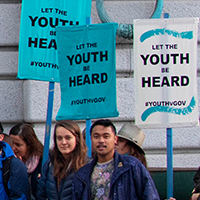
The Right To A Livable Climate
View the page for this story
A federal appeals court recently rejected a bid by the Trump Administration to block a youth climate lawsuit filed in Oregon (Juliana v. US) from moving to trial. This landmark case involves a group of 21 young people who allege that U.S. government actions increase the risk of catastrophic climate change and violate their constitutional rights to life, liberty, and property. Host Steve Curwood and Vermont Law School professor, Pat Parenteau discuss the next steps for what some call ‘The Trial of the Century.’ (10:38)
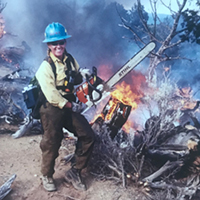
Sexual Misconduct in the US Forest Service: One Woman’s Story
View the page for this story
Abby Bolt loves her job as a Battalion Chief for the U.S. Forest Service, leading forest fire prevention efforts and commanding teams of hundreds of people in a disaster. But in a conversation with Host Steve Curwood, Bolt describes a “good ol’ boy” culture in the agency that casts a blind eye over sexual misconduct, hazing and harassment directed at the few women in the agency. Bolt says instead of addressing complaints, some supervisors in the Forest Service protect the harassers – even punishing women who speak up. (21:49)
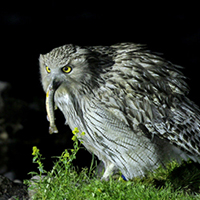
BirdNote®: Blakiston’s Fish Owl
/ Mary McCannView the page for this story
Owls typically hunt mice and small rodents in fields and meadows, but as Mary McCann explains in today’s BirdNote®, Blakiston’s Fish Owl is a bird of a different feather and diet. (02:07)

Beyond the Headlines
/ Peter DykstraView the page for this story
Host Steve Curwood checks in with Peter Dykstra for a look Beyond the Headlines. This week they note a new milestone for electric vehicles in Japan, the country of Belize declaring 10 percent of their ocean a marine protected area, and look back on the infamous oil tanker, the Exxon Valdez, eventually sold for scrap. (03:49)

Conch at the Edge
/ Bobby BascombView the page for this story
The Queen Conch is a large marine mollusk with a beautiful shell that is prized for export and even adorns the coat of arms for the Bahamas. The gastropod inside the shell is featured on menus across the Caribbean. Conch is so desired and desirable that, as Living on Earth’s Bobby Bascomb reports it is in danger of being loved to death. (06:33)
Show Credits and Funders
Show Transcript
HOST: Steve Curwood
GUESTS: Pat Parenteau, Abby Bolt
REPORTERS: Mary McCann, Peter Dykstra, Bobby Bascomb
[THEME]
CURWOOD: From Public Radio International, this is Living on Earth.
[THEME]
CURWOOD: I’m Steve Curwood. As wildfires out West increase with climate change, more women are on the fire lines – facing hazards and harassment as they work in what’s still mostly a man’s world.
BOLT: There's great camaraderie, there's really great teamwork and there's really great friendships. But then along with that can come the hazing, and I dealt with things like porn being taped to my buggy seat; the person that sat behind me used to flick his ashes into my hair. I'd had fire literally lit underneath me, just 'cause they thought it would be funny, and they left me there; I'd have rocks rolled from the top of the hill down towards me; so that kind of stuff would happen and I was so in love with the job and just that first year, my goal was to never ever let them make me cry. And I never did.
CURWOOD: Sexual misconduct in the US Forest Service and more this week on Living on Earth – Stick Around!
[NEWSBREAK MUSIC: Boards Of Canada “Zoetrope” from “In A Beautiful Place Out In The Country” (Warp Records 2000)]
[THEME]
The Right To A Livable Climate
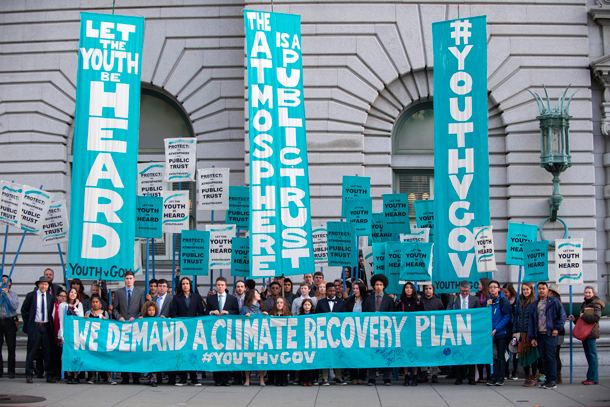
Plaintiffs in the Juliana et al. v. United States outside of the United States Court of Appeals for the Ninth Circuit. (Photo: Robin Loznak)
CURWOOD From PRI, and the Jennifer and Ted Stanley Studios at the University of Massachusetts, Boston, this is Living on Earth. I’m Steve Curwood. The Trump Administration must now face a lawsuit brought by a group of 21 young people who say government actions that increase the risk of catastrophic climate change violate their constitutional right to life, liberty and property. A federal appeals court recently denied a bid by the government to throw out this case known as Juliana v. The US, rejecting Administration claims that the suit is too broad and asks for too much. We turn now to Vermont Law School professor Pat Parenteau. Welcome back to the show, Pat. What do you make of this appeals court ruling?
PARENTEAU: Well, the decision is certainly a victory for the plaintiffs in the short run. I think it pretty much guarantees that we're going to have a trial of some kind in the case. The decision is a little bit of a mixed bag for the plaintiffs, the youth plaintiffs in the case because the judges pretty clearly signal, number one, the case is very broad and the kinds of remedies that the plaintiffs are seeking are also, as the judge put it, may be broader than what is judicially feasible. So, the signal to the plaintiffs is you'd better narrow your case down to the specific actions or inactions that you claim are – are the problem. The judges also said and if the discovery process gets out of control – for example, if the plaintiffs start inundating the government with lots of requests for documents and admissions and interrogatories and all the things, of course, that lawyers do, or if they start trying to depose cabinet-level officials, the Ninth Circuit panel said, “You're free to come back to us if you believe that the discovery process is getting out of control, we will be willing to take another look at this, but for now everybody should just settle down, narrow the case and get to trial.”
CURWOOD: And so this judgment that maybe the plaintiffs are asking too much, this is something that the trial judge herself could deal with rather than the government having to appeal that maybe the plaintiffs are asking too much.
PARENTEAU: Yes, that's true and I think the Ninth Circuit has faith in Judge Aiken, the district court judge. She, of course, submitted a detailed letter, which was kind of unusual to the Ninth Circuit, explaining just how she planned to manage the case and indicating she understood the novel nature of the case and the sweeping nature of the relief that the plaintiffs were seeking, and that there was a long way to go before any final rulings were going to be made. So, I think the Ninth Circuit has some confidence that this particular judge is in charge and in control of the case and can keep it under reasonable limits.
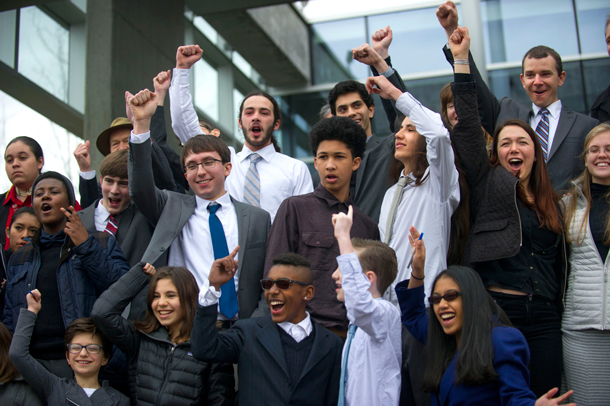
A three-judge panel of the United States Court of Appeals for the Ninth Circuit rejected the Trump Administration’s efforts to halt the landmark youth lawsuit, which is suing the government over climate change. (Photo: Robin Loznak)
CURWOOD: I suppose on one level it is a sweeping case. I mean, these kids want an end to climate change.
PARENTEAU: I mean they're claiming, of course, that they have a constitutional right to have the government act in their interest and protect them from the ravages of uncontrolled climate change, and we're obviously every day now, we're seeing different aspects of the strange changes in the Earth's climate system, weather systems, and so the youth plaintiffs are saying, “Now is the time to ask some of these hard questions. What is the government doing or not doing and why?” And that's what we're going to see with this trial.
CURWOOD: So, if this case ... it sounds like more like when this case goes to trial, what can we expect?
PARENTEAU: So, yeah, I think that there's a good chance that the trial may actually get underway yet this year. That might be a little ambitious, but the trial was originally scheduled to start in February. So, I wouldn't be surprised to see the lower court now set a strict schedule for completing what we call the discovery process and setting this down for trial sometime in the late fall, perhaps October, November. And there's a thing in this process that we call a pretrial order and that lists the witnesses that are going to be called and the substance of their testimony and any kind of arguments about what documents are going to be admitted, things like that. So, there will be a housekeeping kind of procedural order that’ll be very important to watch because that'll indicate the shape of the trial, how long it's going to take, how many witnesses and all of that. That's going to be a very important milestone and we should see something like that I'm thinking towards the end of the summer.
CURWOOD: Now, of course, a trial is based on looking at facts through the lens of the law. But if this thing goes to trial in, say, October, or something, it sounds like this could have a tremendous impact on the Fall elections.
PARENTEAU: Oh, I think it will. I think that there's going to be tremendous interest in this trial. People are calling it the trial of the century, the Scopes trial level kind of engagement. Obviously there's drama with the youth plaintiffs, all 11 of them or so in the courtroom watching what's going on, being interviewed on tape. They're very eloquent, these young people as we've seen, of course, in other contexts. They're well-spoken, they're well versed in climate policy and law. It's quite remarkable. So, I'm thinking there's going to be a lot of media interest in this. The trial will occur in Eugene, Oregon, and I think that you're going to see daily kind of reports and bulletins in coverage and maybe we'll see some Tweets from the president, who knows.
CURWOOD: Now you mentioned the Scopes so-called "monkey trial" around evolution back in the 1920s, but some would say that the kind of precedent this case could set is the even bigger than that, you could be looking at Plessy v. Ferguson, when the Supreme Court said that black people had no rights that white people had to respect, or Brown v. the Board of Education that said that segregated schools were illegal. I mean, how big a deal could this case be?
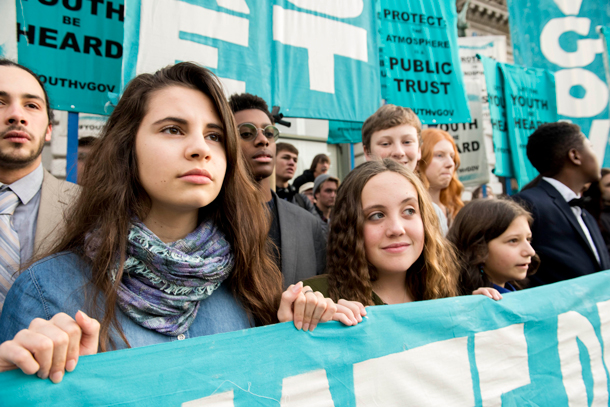
The Juliana et al. v. United States plaintiffs range in age from ten to twenty-one. (Photo: Robin Loznak)
PARENTEAU: While certainly you're right that if the courts conclude that there is a basis in the US Constitution to argue that youth plaintiffs and all citizens, perhaps, have a constitutional right to a safe climate or safe environment if you want to put it that way, that's been the gold standard that a lot of environmental organizations and others have -have sought for a long time, a recognition, formal recognition at the highest level of our legal system, our Constitution, that we all have a right to live in a world, you know, that isn't disintegrating and isn't falling apart and isn't dangerous and out of control. So, that’s as a fundamental right as you could possibly imagine, and if the case gets to the point where we see a decision articulating a new substantive constitutional right that would be more than a landmark. That would really be revolutionary.
CURWOOD: So, now what exactly are these youth alleging that the government is doing to violate their rights to a livable environment?
PARENTEAU: So, it's a long bill of particulars, starting with the president's announcement that we're – quote – “withdrawing from the Paris Agreement.” Now, we haven't actually technically done that yet, that takes a while, but the announcement has been made, the repeal of the Clean Power Plan which was the centerpiece of our commitment to reducing carbon pollution from the electricity sector, the repeal of the fuel economy standards for automobiles and light truck vehicles and off-road vehicles, that's another major rule that would have reduced carbon. That's been on the chopping block of the Trump administration. The repeal of the methane rule controlling methane emissions from the oil and gas industry and the flaring of methane in oil and gas production on public lands, and the repeal of the appliance efficiency standards, yet another major policy initiative that would reduce carbon. So, there's a whole long list of really major sort of regulatory actions that this administration is has either reversed or is in the process of reversing, and I can see that the trial is going to put each and every one of those decisions on trial.
CURWOOD: So, what sense do you have of the strategy the plaintiffs are going to take here? This, in fact, could be such a huge case. The list is very long, that you cited and there are other things I mentioned that other people have put on that list, claiming that the federal government hasn't acted to deal with climate change. What sense do you have of what the plaintiff's strategy is going to be?
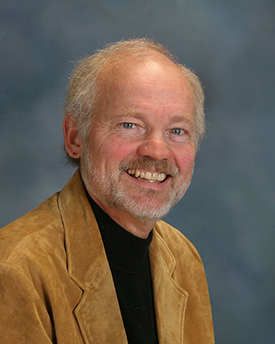
Former EPA Regional Counsel Pat Parenteau teaches environmental law at Vermont Law School (Photo: courtesy of Vermont Law School)
PARENTEAU: Well, I hope the plaintiffs take the cue that the judges on the Ninth Circuit panel gave them, Judge Berzon, for example, several times during the oral argument said to Julia Olsen who is the lawyer for the plaintiffs, "You really need to think hard about what are the most important things that the federal government is doing that you believe are exacerbating the threat of climate change." And she focused specifically, Judge Berzon did, on the way public lands and waters are being managed, and the fact that the Trump administration has now leased virtually 90 percent of the coastal waters of the United States to oil and gas development, that it's opened the Arctic National Wildlife Refuge for the first time to massive potential oil and gas development and so forth. I think if the plaintiffs are paying attention and if I were them I would really look to narrow the scope of the case to a relatively small number of major items and major issues that could make a really significant difference in bending this trajectory of emissions in the direction that the scientists are telling us.
CURWOOD: So, if I hear you correctly, Pat, you're saying perhaps the strong if not the strongest strategy here would be to be suing the federal government for selling off fossil fuels from public lands and waters at a time when the government knows that the combustion of those fuels is in the process of destroying the planet?
PARENTEAU: Yes, and these are what we call path determining decisions. When you offer for lease all of these offshore oil and gas deposits, and you lease all of the on land oil and gas in places like the national monuments - Bears Ears which the president, of course, has shrunk to almost nothing – you're determining for a very very long period of time, decades, the way that those lands are going to be managed, the way that those fossil fuels are going to be extracted, and this is all in the face of evidence suggesting we have to be going in the opposite direction, at least slowing down the rate at which we're developing these resources and at least identifying some of the areas that are sensitive environmental areas and this would include some of the Arctic resources and others which would be absolutely the last place you should be going for fossil fuels, not the first.
CURWOOD: Pat Parenteau is a Professor at Vermont Law School. Thanks so much for taking the time with us today.
PARENTEAU: Thanks, Steve. Appreciate it.
Related links:
- InsideClimate News: “Children’s Climate Lawsuit Heads to Trial: Court Rejects Trump Attempt to Block It”
- Juliana et al. v. United States, Our Children’s Trust
- Meet the 21 Youth Plaintiffs
- Vermont Journal of Environmental Law- Juliana v. United States: Does the Constitution Guarantee a Livable Planet for Our Kids?
- About Vermont Law School Professor Pat Parenteau
[MUSIC: Gary Burton, “Walkin’ In Music” on Next Generation, by Julian Lage, Concord Records]
CURWOOD: Coming up, “Me too” comes to crews fighting wildfires on public lands. That’s just ahead on Living on Earth, keep listening!
ANNOUNCER: Support for Living on Earth comes from the Gordon and Betty Moore Foundation, and from a friend of Sailors for the Sea, working with boaters to restore ocean health.
[CUTAWAY MUSIC: Gary Burton, “Walkin’ In Music” on Next Generation, by Julian Lage, Concord Records]
Sexual Misconduct in the US Forest Service: One Woman’s Story
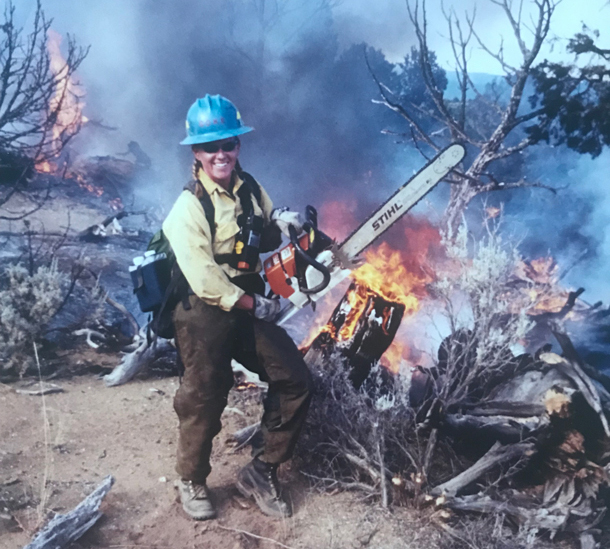
Abby Bolt has been in the U.S. Forest Service for 21 years. (Photo: courtesy of Abby Bolt)
CURWOOD: In 2016 we ran a story about sexual misconduct and harassment in the agencies that manage US public lands. Women spoke of assault and intimidation in the National Park Service and the US Forest Service where firefighters are overwhelmingly male. There was talk of change, and some, but not much, action in response to the complaints.
Well, since then the “me too” movement has brought to light the widespread incidence of such misconduct. US Forest Service Chief Tony Tooke recently resigned amid allegations of sexual wrongdoing. He quit just a few days after PBS Newshour ran special segments about abuse and harassment in the agency, focusing on some of the women who have filed complaints and suits. Today, we bring you the story of one of those women in the Forest Service. Abby Bolt is a battalion chief in the firefighting division based at Sequoia National Forest. Welcome to Living on Earth, Abby.
BOLT: Hi, thanks for having me.
CURWOOD: So, first tell me about your job. I understand that you've been with the Forest Service for a number of years.
BOLT: Yeah, I cannot believe that I'm into my 21st year of fighting fire. I just started doing it to put myself through college and do it in the summers and then next thing you know, I became what they call a "lifer" and took the full-time job. And now it's been over 20 years. I started off with hotshots and was a helicopter rappeller, and then went into hand crews and engines and now I actually specialize in fire prevention and public education.
CURWOOD: Hot shots, I mean, helicopter rappelling sounds like either jumping out of planes or climbing out of aircraft right into places that are on fire. Why do you do that? Why do you want to do that?
BOLT: Ahh, those were the highlights of my career. Why do I want to do it? I mean, I grew up in the outdoors. I love to play sports. I love to be athletic and competitive, and you know, it's hard to be on a professional ball team. So, the next best thing was being on a team to fight fire, and there was just so much satisfaction to it that it's addicting. You know, even the worst days, the most miserable days where you're just trudging along in the ash just doing the same menial work looking for little hot rocks all day long, even those days are really memorable and great.
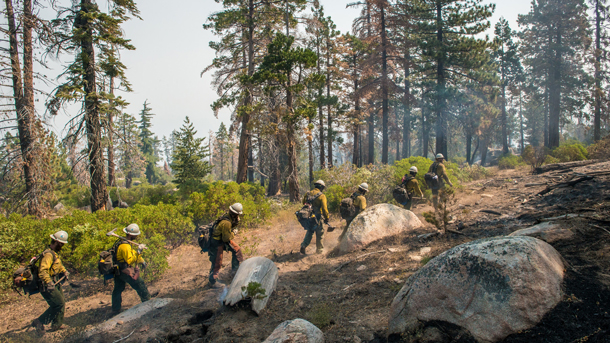
Earlier in her U.S. Forest Service career, Abby Bolt worked as a hotshot firefighter. Above, a crew of hotshots tackles the Cedar Fire in the Sequoia National Forest, August 23, 2016. (Photo: Lance Cheung / USDA, Flickr CC BY 2.0)
CURWOOD: What kinds of behavior have you noticed over the 22 or so years that you've been working with the US Forest Service?
BOLT: There's a great camaraderie, there's really great teamwork and there's really great friendships, but then and along with that can come the hazing and some of that behavior that probably isn't acceptable, but when you're brand new you don't really realize it. So, my first years I dealt with … I dealt with things like porn being taped to my buggy seat. The person that sat behind me used to flick his ashes into my hair and I didn't know it until it was melting my hair and people told me about it, but that would happen days on end, and you might pick up your backpack and it's full of rocks or maybe a dead animal in it or there might be you know, something silly and I don't know that...I think it just has to do with being the odd man out, you're the new person. I was the first girl on a crew who hadn't had a woman in a long time and they just they didn't really know any better, I think, and I just wanted to be there. I was so in love with the job and just that first year my goal was to never ever let them make me cry, and I never did. So, that kind of thing, you'd open up your pack, toss the things out, keep moving.
CURWOOD: So, in that first year did you say anything to your supervisors or or anybody about the harrassment, you know porn being left on your truck seat isn't exactly ordinary hazing.
BOLT: I did, because I didn't want to be the only girl they had in a long time and then instantly be a problem. So, I tried to defuse a lot of it on my own and blow a lot of it off, and then there was one particular guy that just would not stop. He wouldn't stop picking at me and I remember it would make me so angry, he would either, you know, physically shove me or touch me or throw things at me or basically dump all of his work on to me. He would drop things at my feet that he was supposed to be carrying, just little silly schoolyard things and I just got so frustrated, that and all of that other stuff happening on the side.
I finally went to my supervisor at that time and just said, “hey I need your help ... can you just help me deal with this guy.” I wasn't complaining, I just said I needed to deal with him for me and he just simply said “Hey, Abby, you're on your own.” And I said, “Well, on my own, I'm getting so frustrated I'm going to end up smacking this guy with my tool at some point to get him to back off,” and he said, “Well you do what you need to do.” And that day kind of came there was a day where I finally he did something to me out in the middle of a fire and I remember I was so mad and couldn't get him to back off and I did smack him with my tool to get him to back off. That's just kind of that you take care of yourself, and that's what I was told. And towards the end of the season, when we were doing our exit interviews, I told all of the supervisors on the crew, I said, “Hey, just just know that this was going on and that I'm not going to complain because I love this job, but I just want you guys to know so you watch out for it in the future,” and I would like to say to think that they took that forward and did something good with it, but I was actually pretty much blackballed for a long time because I said that.
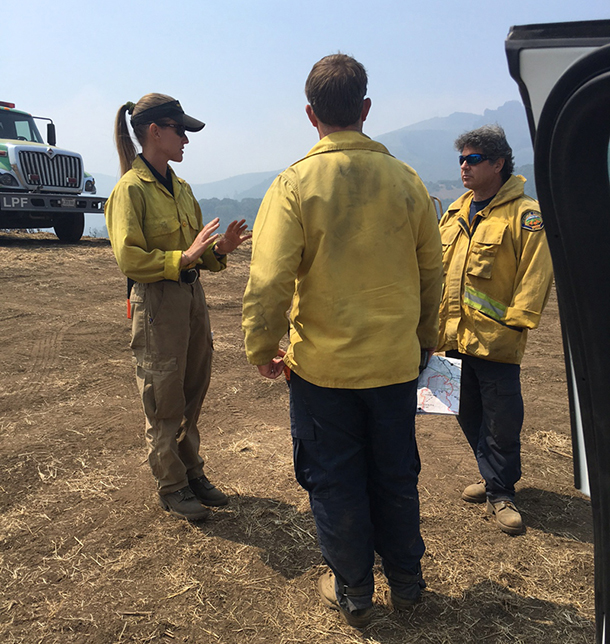
While managing a forest fire as a Battalion Chief, Ms. Bolt oversees a chain of command that can include 300 to 500 personnel. (Photo: courtesy of Abby Bolt)
CURWOOD: And their solution was violence. Hey, these guys are hassling you, then do whatever you need to do to take them out. Almost an explicit order to you to do something physical.
BOLT: Right, and it was. And at that point in my life, I mean, I didn't even know about things like EEO or formal reports, and I don't think I ever even filed one of that point, and what ended up happening is the guys that were on the crew that believed in me, they rallied around me like brothers and ended up sticking up for me and they – they handled that guy in the end. So, they did.
CURWOOD: But you were blackballed.
BOLT: Yeah, I was.
What did that mean?
BOLT: I didn't realize how bad it because I performed well and I did a good job and I went on to do great things and continued there and then became a rappeller, but one of the supervisors, the one that I asked for help and told me to deal with it on my own, years later I actually got a job offer somewhere on another hot shot crew and he went out of his way to make a phone call to tell them that they shouldn't hire me, and he had no reason to do that, no reason at all except for I did stand up and say, hey, you guys could have some problems with women on this crew if you're not careful. I just gave them a fair warning and years later, he made sure to ruin a job for me.
CURWOOD: So, they didn't hire you on that crew.
BOLT: It was even after they had made the official offer and then they rescinded after he reached out. That's a piece of that good old boy stuff that goes on and it can follow you in fire and and burn you for the rest of your career, and that's why people stay quiet.
CURWOOD: So, talk to me what happened to you back in 2012. You went on assignment in Colorado.
BOLT: Yeah, I was actually in Wyoming and Colorado and I was with an incident management team, and we were traveling around the country, had a few fires that we were dealing with and one was in Wyoming, and then also we were partly in Colorado. And towards the end of the assignment I was sexually assaulted and raped by another firefighter that wasn't a member of our team, but he was there working with them and it was a violent situation by somebody that I was an acquaintance with and I never understood like how that could happen or what you do in that situation. and I just I remember negotiating with him and pleading with him, and long story short I was covered in bruises and, yeah, so...
CURWOOD: I'm so sorry. It's just so horrible.
BOLT: Yeah, it's just one of those situations you find yourself in and it's surreal, like it's not happening to you, you're just watching a TV show in your head that must be all that it is, and the next day it was time for me to drive home back to California and I just ... I was in shock, literally in shock and shame and I didn't know what to do. Like I knew that it was wrong and I knew that I needed to do something about it and report it, but then all the thoughts in your mind of what's going to happen to you in the agency and in the fire service, what will rip your career apart. You know, when I show up to a fire, I show up and people look at me and go “There's Abby, that's that division supervisor we had on that fire where we saved all those homes.” And after you report something like this you show up to a fire and now “There's Abby, she's that gal that was in that rape trial that ruined that firefighter's life.” It becomes your identity, and we had a team of like 56 people there, and once I reported it, an investigation would have shot through the roof. Everybody...that whole team would have been stood down for fire assignments and they would have been questioned and it would have brought so much darkness to so many good people. I didn't want everybody else to have to pay for what I went through.
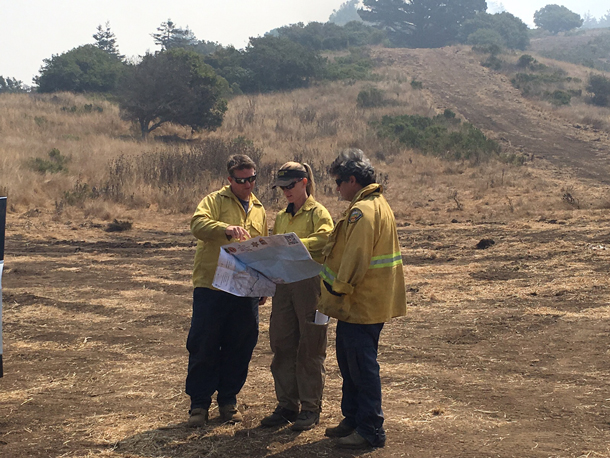
Ms. Bolt and two other U.S. Forest Service fire officials consult maps while commanding a firefighting operation in California. (Photo: courtesy of Abby Bolt)
So, on my way home driving back to California, my best friend ever since we were little is with the police department here and I reached out to her just in tears and I told her I didn't know what to do, and of course she was pleading with me to report it and told me that I had to, and I explained to her all the reasons and she know how it works in her department, what it would feel like for her. And because imagine the investigation, it's not just a police investigation. We're talking federal, all the agencies, it would have been a mess in different states, and I've seen how our agency doesn't do very well on things that are much less than that. How would they have treated that? How would they have treated me? How could I have trusted them? So I told her and she convinced me to come down and at least do the police report. And I met with the SVU detective and we went through all of it, and I went to the hospital and I did the rape kit to make sure that all the evidence was captured. But I just – I couldn't bring myself to actually tell the agency because I just … I knew it would ruin everything, and it would be easier if I could if I just kept moving forward.
CURWOOD: So you got the rape kit from the local police department where you were assaulted or back home or?
BOLT: Actually, back home where I live, and they ended up working with the police department where I was assaulted, and both of those detectives kept following up with me and they were pleading with me to press charges, and I just couldn't bring myself to do it. It was in the middle of the fire season. I was still traveling around fighting fire, and I just – I wanted to be known in the agency for my firefighting abilities not for that. Of course, now that's changed, but they kept telling me you've got to do something or this will happen again or maybe he's doing this to other women or ... you know and I was thinking about his family and his children that I knew that he had and I didn't want to ruin anybody else's life, but I instead of confiding and letting the police protect me or going through the judicial system which I just didn't trust at the time, I confided in a – in a friend on a hot shot crew that I was really good friends with and I knew that he knew my assaulter, or I knew that he knew who he was because they both lived in Arizona. He told me, “Abby don't worry we will watch out for you and you give us the word and we will take care of him and we will keep him away from you.” It's a bunch of brothers in this job, it's a bunch of big brothers that are just amazing and like their little sister, they made sure that I was protected and we would go to fires and if he would be around, they would - they would eat their meals with me, they would just keep an eye on me, and they did put him in check couple of times, and had to pull him aside and so they were my justice. It ended up being kind of a brotherly justice that I had and it felt like at least that was something that I did have to protect myself and not let that man know that it was known about and he was put in check. But then in 2013 that friend of mine and his entire crew except for one of them, they all died in a fire.
CURWOOD: They all died in a fire.
BOLT: Yeah. So, they all died in a fire in 2013, and I think I was just devastated from that already, but then that was my justice, and I also lost my justice and my answer to how I responded to the assault. So, that tore me up pretty bad.
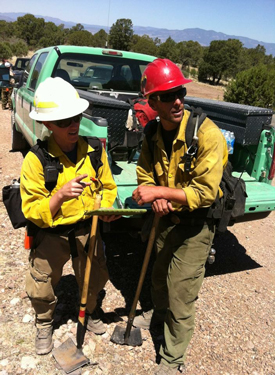
Abby Bolt, left, with Jesse Steed,
who was the friend and colleague in whom Ms. Bolt confided about her 2012 sexual assault. Tragically, in 2013, Steed and his entire Granite Mountain Hotshots crew, except for one team member who was at a different location, perished when they were overrun by the Yarnell Hill wildfire in Arizona. (Photo: courtesy of Abby Bolt)
CURWOOD: One of the things that so awful about sexual assault is obviously, how people ... what happens to your life afterwards. How are you doing in the aftermath of this? It's just such a devastating thing.
BOLT: Yeah, I'm still trying to figure it out actually. I'm still trying to figure that out. And I think I buried a lot of it, and this is all definitely pulling it forward. I didn't tell my family. I told, you know, I was married at the time and he knew, and you know we -- he helped me through it, and but it was really hard on us. But I didn't tell my mom and my dad because, one, I was afraid my dad might just lose it and go out and take care of his daughter. But I just, I didn't want that weighing on their hearts, you know, so I kept it inside and just worked with the police and then worked with those friends of mine that were watching out for me and I buried it and that's definitely affected me though. The fact that it all happened isn't what gets me so much right now and why I've come forward about it. The fact that that I knew that I wouldn't be able to trust in the agency to take care of me if I reported it.
CURWOOD: Talk to me about the kinds of bullying that you have experienced since that incident.
BOLT: The bullying that I've dealt with since then, it wasn't – didn't have anything to do with that incident because I hid that from my agency in general. So, since then it's been like ever since I would speak up for either myself or for other employees that weren't being treated well, I've just been completely burned for that. But it all seemed to happen when I went under the supervision of a particular supervisor because for 18 years before that, maybe I had worked for somebody difficult, but I never had these problems. And I'm dealing with all that with in a complaint now and I've tried, the thing that kills me is I tried from the lowest level because that's how we're taught, try to fix things at the lowest level. If that doesn't work, go to the next level, and then the next level. And I just was banging my head against the wall with the lowest level trying and trying and trying, and then the next level. But what happens is you bring something to the attention of your supervisor and if his supervisor wants to protect him he absolutely will.
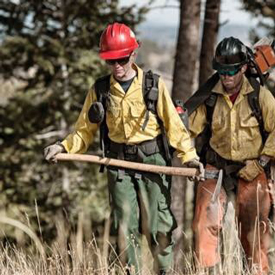
Despite the hazing and harassment Ms. Bolt says she experienced during her first year firefighting with the Forest Service, she says, “That goal my first year was to never ever let them make me cry. And I never did.” (Photo: courtesy of Abby Bolt)
I would speak out about something that was so blatant, but then it was almost like his supervisor didn't want that sort of a thing to come out, and they start covering up for each other because then if the word gets out that there is a hostile work environment or some sort of poor treatment happening on their unit, that's going to get out further and further and that's not going to look good. So, I think that motivates them to cover up for each other, and then they start making the person that is making a complaint look like the problem because it's a lot easier if you get rid of that problem than if you admit that there's actually a problem on your unit or a problem with one of your leaders.
CURWOOD: What kind of litigation, if any, are you engaged in now against the department given this devastating history?
BOLT: Well, you know t's been ... 2014, I finally had to step forward and file a complaint and that fire season kind of ate that up. There's really no employee advocates out there that are truly on the employee's side, so it's really tough when you file a complaint to know what your deadlines are and really understand all of that and have an advocate because you also are expected to do your regular job. There's a lot of time that has to be spent on that, but if you're the agency that you're filing a complaint against, they have endless resources to help them. So, that moved on and I basically just had to let things go because I needed to get on with the season and being a supervisor, but then the retaliation started.
There were a lot of opportunities taken away. I used to teach at academies and I'm talking about big fire academies that were very respected. They wouldn't let me teach any more. I was on committees. They took me off of all of the committees that I was on. There are a lot of opportunities that are critical for your career and your advancement and your networking, they were just slowly taking all of those away. They made me move my office miles away from where it was, just me but not the other male that worked there that was in the same position. So, then I made the phone call and started the retaliation complaint. So, that was in 2015. And then one thing after another where they're just not being responded to. I'd reach out to our civil rights folks and tell them literally what was happening in my office and I would literally write e-mails that said, “Please help me,” as blatant as I could so that they would maybe read them and they would say maybe we should check in on her and see what's going on, and they would get ignored for for a long time.
CURWOOD: Outside of official actions that feel like retaliation, to what extent have you felt threatened, intimidated, by things that you're not sure of the source of, but nonetheless for you, well, frankly downright creepy?
BOLT: That's what starting to eat me up and, you know, the supervisor that I was working for and he's moved on, he would make very odd comments and it was getting creepy, and then it was actually just a one sentence note that was typed up and addressed to me in my inbox and said that that I was a prime example of why women didn't belong in fire, especially single mothers. And then my – the back of my car window was written in, just the word "quit" and I had heard that one of my supervisors had been saying that and he had also said it to me in passing. So, it just makes you not even want to enter the building, and I go to bully meetings at my child's school, bullying prevention meetings and we're talking about how to keep kids safe on the playground and in the classroom, and I sat there one day and realized like, oh my gosh this is verbatim what is happening in my workspace. You know, it's schoolyard bullying at an adult level.
CURWOOD: Firefighting is a dangerous business and I'm sure you've been in many situations where you really needed to make sure that the people you were with were going to literally have your back. To what extent did you feel that the harassers, the bulliers didn't in those circumstances?
BOLT: There was – there was a time in the very beginning where that happened a few times. There was, you know, I had had fire literally lit underneath me, just because they thought it would be funny and they left me there. I’d had rocks rolled from the top of a hill down towards me, which have killed people. There's that kind of thing. So, yeah, you kind of lose that sense of safety because if they're not going to be good to you in the buggy, they're not going to be good to you out on the fire line.
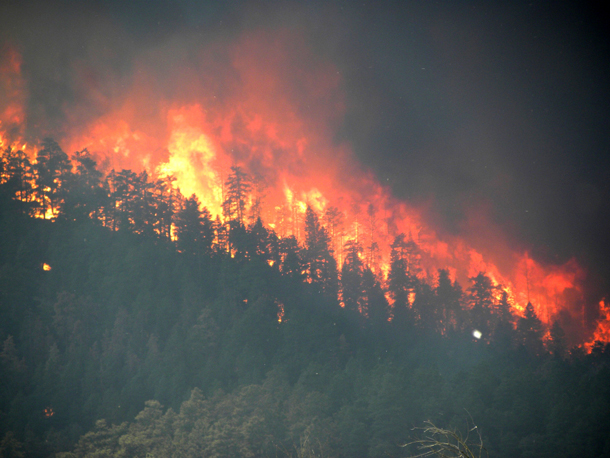
Forest fires are becoming more intense, and fire seasons longer, as climate change warms and dries out trees throughout the West. (Photo: U.S. Department of Agriculture, Flickr CC BY 2.0)
Now, that I'm further in my career and I'm in more of a leadership position, I even told our four supervisor this in writing and in person several times about the hostile work environment and the hazardous human behavior that was happening underneath him with a couple of our fire leaders, and I told him that eventually this kind of behavior is going to bleed over to a fire and the behaviors that they're displaying in the office were going to come out on the side of that mountain in the fire because maybe – maybe they don't answer the radio when they should just to be mean or maybe they don't fill an order when they should or call that helicopter when they should just because they're retaliating and eventually it's going to get somebody killed.
CURWOOD: Abby, what gives you strength to go through this? What's helping you get through all of this?
BOLT: Well, my family. If I didn't have my family, you know, I've got really strong sisters and my mom for women, and my parents always taught me to speak up if you see something wrong, say something, do something about it. And it's so much easier for me to speak up and protect somebody that isn't me. I'm much more comfortable speaking out for someone else, and it's been really hard for me to speak out for myself, and my significant other, he's been amazing. He's also with the agency and so supportive and he admits he had no idea how bad it could be until he saw it from my eyes and saw it from the inside, and if it weren't for the folks that love me, I don't know what I would do right now, and there's so many gals in fire, and just the e-mails and the phone calls and the messages I've gotten since I came out on PBS, like, there will be another one that will come in that will confess to me the pain that she's been in what she's dealt with and she's thanking me for speaking out because she can't because she's scared, and I'll get one of those and I think, “Now that is the reason I did this. That's the reason I'm speaking out.” And then I'll get another one and I think, “That's the reason,” and quite honestly, there's ... still when I go into a classroom to teach about fire prevention, there will be little girls that walk up to me still and they say like, “I didn't know that girls can do this, and it breaks my heart. I'm like, “You guys, it's 2018, what do you mean you didn't know little girls could do this? You can be anything you want to be.” And I realize that anything that I do now to help bring progression is going to help some little girl some day that I'm never going to meet. If I lose everything right now, but it is going to make things a little bit better then, I'm good with that because that's how strongly I stand behind this.
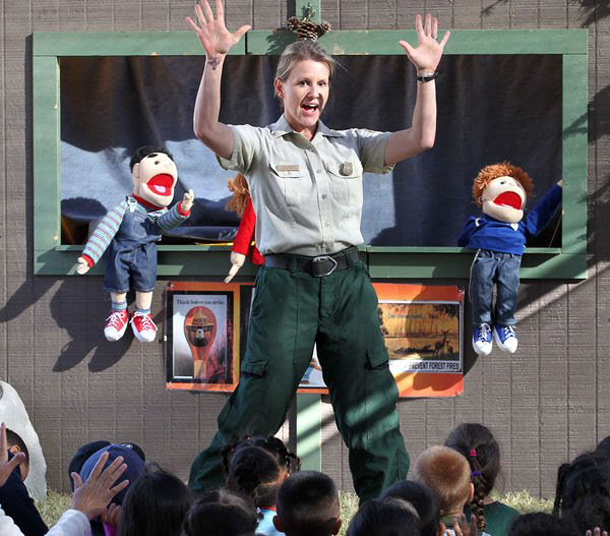
As a Battalion Chief, Abby Bolt teaches kids and the public about forest fire prevention. (Photo: Casey Christy / Bakersfield Californian News Paper)
CURWOOD: Abby Bolt is a battalion chief with the US Forest Service Fire Fighting division. Thanks so much for taking the time with us today.
BOLT: Thank you for having me. It's been a really a pleasure and thank you for the work that you guys do.
CURWOOD: There’s more on this topic at our website – loe dot org. It includes the story of a young woman who thought working for the US Forest Service was just the job she wanted.
MYERS: I got what I thought was a dream job, fighting wildland fires. You know I was gonna get paid to go hike out to fires and camp and it was gonna be really exciting.
CURWOOD: But sexual harassment and bullying quickly turned that dream into a nightmare. To hear her story, and for more about the challenges women face protecting public lands, go to our website loe dot org. And share your thoughts and experiences, if you like. Write to comments at loe dot org. That’s comments at loe dot org.
The U.S. Forest Service declined to comment on specific cases, citing privacy, but in an email to PBS NewsHour said it takes “all reports of sexual harassment very seriously.” The link to the Forest Service's Anti-Harassment Policy is below.
Related links:
- Listen to Michaela Myers' story about her experience of sexual harassment and hazing during 2017, her first season fighting fires
- Listen to our interview with PBS NewsHour reporter Liz Flock about the systemic sexual harassment problems U.S. Forest Service women describe
- Our 2016 LOE story: “Sexual Harassment Blights National Parks and Forests”
- U.S. Forest Service Anti-Harassment Policy
- PBS NewsHour: “They reported sexual harassment. Then the retaliation began”
- The Washington Post: “Interim Forest Service chief named amid misconduct charges”
[MUSIC: Glen Velez, “Pan Eros” on Pan Eros, CMP Records]
CURWOOD: Coming up, why a treasured icon of Caribbean culture and cuisine is disappearing – That’s just ahead here on Living on Earth, stay tuned.
ANNOUNCER: Support for Living on Earth comes from the Gordon and Betty Moore Foundation, and from a friend of Sailors for the Sea, working with boaters to restore ocean health.
[MUSIC: Glen Velez, “Pan Eros” on Pan Eros, CMP Records]
BirdNote®: Blakiston’s Fish Owl
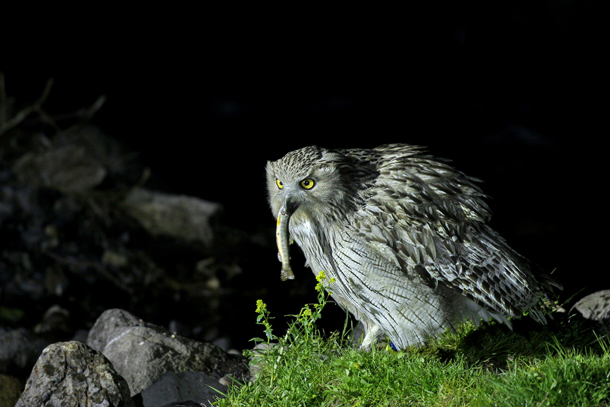
A Blakiston’s Fish-Owl with prey. (Photo: Hiyashi Haka)
CURWOOD: It’s Living on Earth, I’m Steve Curwood.
[MUSIC - BIRDNOTE® THEME]
CURWOOD: When most of us picture owls, we see them swooping low on silent wings over fields in search of mice and voles. But as Mary McCann points out in today’s BirdNote, some owls choose a different diet.
BirdNote®
Blakiston’s Fish-Owl - Fishing for Salmon
[Hooting sequence of Blakiston’s Fish-Owl]
Deep, sonorous hoots signal the presence of a sumo wrestler of a bird.
[Hooting]
It's Blakiston’s Fish-Owl. Blakiston’s, because its existence was recorded by the English naturalist, Thomas Blakiston. And Fish-Owl, because, it hunts fish. Standing at the edge of a stream, sometimes in the shallows, it watches intently. Eyes fixed on the water. Then, with a sudden jump forward, wings upraised, it plunges its talons into a fish and pulls it onto the bank – sometimes, a fish as large as a salmon.
This massive bird is the largest owl in the world. Tawny brown, a female Blakiston’s Fish-Owl is the larger of the sexes and may stand 28 inches tall, weighing in at over ten pounds. That's the same weight as a Bald Eagle. Compared with our largest familiar owl, the Great Horned, the Blakiston's is six inches taller and nearly three times as heavy. No other owl approaches its prodigious girth.
[More Hooting]
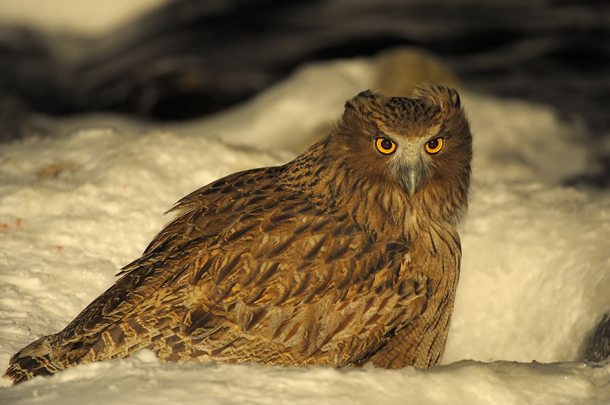
A Blakiston’s Fish-Owl, considered to be the largest owl in the world. (Photo: Robert TDC)
But the Blakiston's Fish-Owl is endangered. It's found only in wooded areas in the east of Japan's second-largest island, Hokkaido, and in small areas in adjacent Russia and China.
Future preservation of forest and river habitats in these regions will be crucial to the survival of this one-of-a-kind owl. I’m Mary McCann.
###
Written by Bob Sundstrom
Blakiston's fish owl 1163700 recorded by David M., Xeno-Canto.org
Nature SFX Essentials #18 “Stream, Moderate” recorded by Gordon Hempton of QuietPlanet.com
Producer: John Kessler
Executive Producer: Dominic Black
© 2005-2018 Tune In to Nature.org March 2018 Narrator: Mary McCann
https://www.birdnote.org/show/blakistons-fish-owl
CURWOOD: And for pictures, swoop on over to our website loe dot org.
Related links:
- This story on the BirdNote® website
- Blakiston’s Fish-Owl on Arkive
- Blakiston’s Fish-Owl Project
- Watch: Blakiston’s Fish-Owl Catching Fish
- Watch: Blakiston’s Fish-Owl in Hokkaido, Japan
[MUSIC: Lloyd Thayer, “The Run Up Butter Mountain” on Birds, self-published (www.lloydthayer.com)]
Beyond the Headlines

Electric charging stations in the US are still relatively uncommon but in Japan there are now more EV stations than gas stations. (Photo: Wikimedia Commons)
CURWOOD: We’ll check in with Peter Dykstra in Atlanta, Georgia now. Peter’s an editor with DailyClimate dot org, and Environmental Health News, that’s ehn.org and he digs into the world beyond the headlines – hi Peter, I see you have a new studio companion – your cat?
DYKSTRA: Yeah, my daughter’s cat. She will not have a speaking role in order to keep costs down.
CURWOOD: [LAUGHS] Okay, good. Hey, so what do you have for us today?
DYKSTRA: Well, Japan has some of the highest gas prices in the world: over five bucks a gallon. That’s one of the reasons why they got into electric vehicles early.
CURWOOD: Yeah, they certainly have been the leaders in electric – or hybrid. I remember being in Japan in 1997, riding in my first Toyota Prius. What’s going on now with EVs?
DYKSTRA: So, little bit of a landmark that was passed recently in Japan. They now have more EV charging stations than gas stations in Japan. About 40,000 for EVs, about 34,000 for gas stations.
CURWOOD: Well, being Japan, I imagine that, even though it’s an EV charging station, you’ll be able to get some decent sushi and stuff like that.
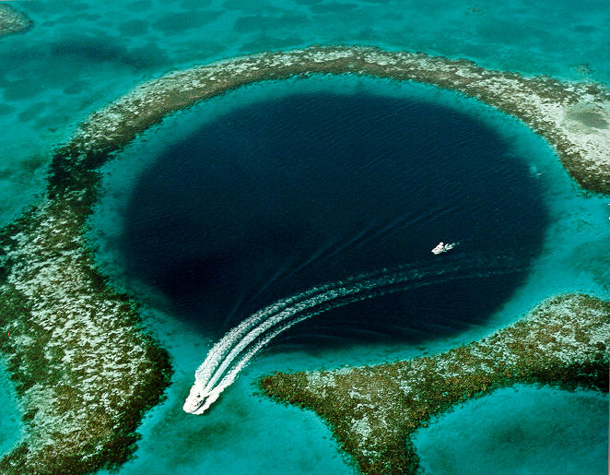
The Blue Hole is a mecca for SCUBA diving in Belize. (Photo: Wikimedia Commons)
DYKSTRA: Well, yeah, the waiting time that it takes to recharge an EV in Japan, you can maybe get some good food or do something else, as opposed to going into a US gas station and getting Slim Jims, and lotto tickets, and day-old hot dogs.
CURWOOD: Hey, what else do you have for us today?
DYKSTRA: Well, let’s go to Belize, a little bit more good news. Belize is a country that has really staked its economy to the ocean; to diving, snorkeling, and sport fishing. They’ve decided to commit 10% of Belizean waters in the Caribbean to Marine Protected Areas. And that’s a big step forward for the trend for protecting ocean areas around the world.
CURWOOD: And if you’ve been to Belize, if you go diving, even just snorkeling, it’s beautiful; they have a lot of stuff on their reefs still.
DYKSTRA: Yeah, and the total area doesn’t match some of the huge areas in the Pacific that have been declared, one recently around Easter Island. Easter Island, of course, is famous for those huge stone heads. And as far as US territory in the pacific, President Obama created several areas, but you know what, so did President George W. Bush. As bad an environmental rap as President Bush got, he did a lot in Marine Protected Areas.
CURWOOD: So, what do you have for us this week, now, from the history books?
DYKSTRA: Well, in 2012, this time of the year, the Exxon Valdez was sold for 16 million dollars for scrap. And after its catastrophic spill up in Alaska in 1989, the Exxon Valdez became something of an outlaw. It changed its name from the Exxon Mediterranean, to the SeaRiver Mediterranean, to the S/R Mediterranean, to just the Mediterranean, to the Dong Fang Ocean, and when it was finally sold, it had been converted to a bulk ore carrier and it was called the Oriental Nicety.

The infamous oil tanker Exxon Valdez that went aground in Alaska and spilled 11 million gallons of oil changed its name several times before being sold for scrap metal. (Photo: NOAA)
CURWOOD: [LAUGHS] Indeed. So, it was a single-hull tanker. They’re banned now, right?
DYKSTRA: Single-hull tankers can no longer operate in the US, whether they’re US flagged or not. We don’t know how many remain around the world, but ships like big bulk container ships can still have a single hull, and they still spill. They don’t carry oil as a cargo, but they carry it as a fuel, and there’ve been some pretty damaging single-hull spills from other ships as well.
CURWOOD: Well, farewell, the Exxon Valdez. And thank you, Peter Dykstra. Peter is editor with Environmental Health News, that’s EHN.org and DailyClimate.org. And we’ll talk to you again real soon!
DYKSTRA: All right, Steve, thanks a lot. We’ll talk to you soon.
CURWOOD: And there’s more on these stories on our website, LOE.org.
Related links:
- Environmental Health News
- The Daily Climate
- Transport Evolved: It's Official: Japan Now has More Electric Car Charging Spots than Gas Stations
- Caribbean Journal: Belize Is Expanding Its Marine Protected Areas in a Big Way
- The Seattle Times: Exxon Valdez sold for scrap
[MUSIC: BR5-49, “You Flew the Coop” on Big Backyard Beat Show, by Gary Bennett, Arista Records]
Conch at the Edge

The Queen Conch is a large marine mollusk found throughout the Caribbean. (Photo: Wikimedia Commons)
CURWOOD The Queen conch is a massive mollusk that grows an impressive and lovely spiral shell with a wide flaring lip and a bright pink interior. Conch are ubiquitous across the Caribbean – the decorative shells are exported and made into jewelry, and the huge gastropod inside is a staple food there. But as Living on Earth’s Bobby Bascomb reports, new research suggests that the conch is possibly being loved to death.
[SOUND OF CONCH SHELL BEING BLOWN]
BASCOMB: Learning to produce a musical note out of a conch shell is a desirable skill across the Caribbean. In Key West, Florida – known locally as the capital of the Conch Republic – people come out in droves to compete in the annual conch honk. Children make their best effort – they blow into one end of the huge shell that can weigh up to 5 pounds.
[SMALL CONCH SOUND, AUDIENCE CHEERS]
ANNOUNCER: Beautiful, very good Luna. Good job!
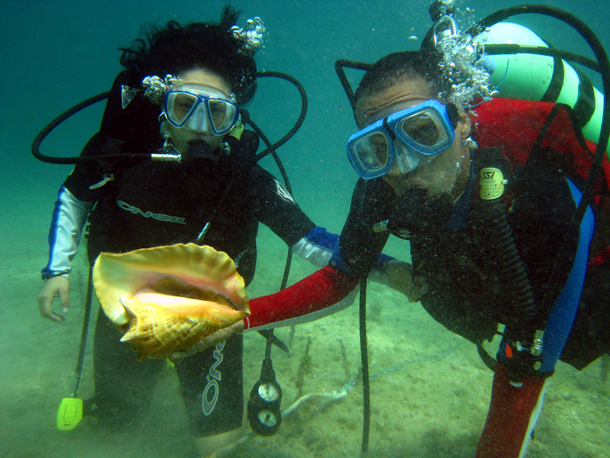
Researchers dive to collect data on conch in the Caribbean. (Photo: Community Conch)
BASCOMB: But a middle age man in a bright pink t-shirt knocks it out of the park.
[CONCH MUSIC, APPLAUSE AND SHOUTS]
BASCOMB: This year’s conch honk held just last week even involved a marriage proposal. Mary Lou Smith took her turn on stage wearing a lei and flowered dress, then a man in a matching lei and flowery shirt got down on one knee with a ring in one hand and a conch shell in the other.
MAN: Mary Lou, we’ve been together long enough for me to know that I want you for the rest of my life. Will you marry me?
[AUDIENCE APLAUDS]
BASCOMB: She responded appropriately for a conch-blowing contest.
[MARY LOU BLOWS THE CONCH]
ANNOUNCER: I think that was a yes!
[CHEERING AND CONCH SOUNDS FADE UNDER NEXT GRAPH]
BASCOMB: Conch are also a local delicacy. As for how to prepare it, the list is as long as Bubba’s ways to prepare shrimp in the movie Forrest Gump. There’s…. cracked conch, conch chowder, conch fritters, conch salad, conch and rice – you get the idea…
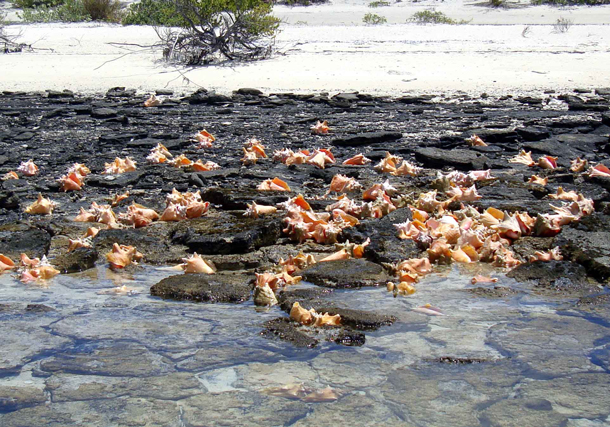
Researchers measure discarded conch shells to see what size animals fisherman are harvesting. (Photo: Community Conch)
As beloved as it is though, the conch fishery in the Florida Keys has actually been closed since 1975. So all of the conch enjoyed in the Conch Republic has to be imported, mostly from the Bahamas. Alan Stoner, chief scientist for the conservation organization Community Conch, has been conducting surveys of conch populations in the Bahamas for more than 20 years.
STONER: By 2016 the density of conch was down to only 10 percent of the original density in very shallow water.
BASCOMB: Stoner says overfishing is the culprit. Half a million pounds per year are exported and more are consumed locally. To keep up with demand, methods for harvesting conch have become more sophisticated. Historically fishermen would free dive with a mask and snorkel to scoop them out of the sea grass. But now fishermen use surface supplied air equipment called hookahs, which allows them to stay underwater longer.
STONER: When hookah is added to the fishing equipment, almost every conch is just available to fishers.
BASCOMB: Adding to the problem, there’s no closed season for conch in the Bahamas and some conch are legally harvested before they reach sexual maturity so they never have a chance to reproduce. That’s bad news for people who like to eat conch fritters and worse for marine species that depend on the mollusk for food.
STONER: There are a whole host of predators that require conch at least as part of their diet and that would go right up to sea turtles and things like octopus which take a very large number of conch.
BASCOMB: The Bahamas has a network of Marine Protected Areas where conch are safe from human harvest but even there, researchers are finding far fewer conch than they did just a decade or two ago. Stoner says the density of conch is just not high enough for the animals to reproduce.
STONER: We need about 50 conch per hectare, a hectare is about the size of a soccer field and if you don’t have 50 mature adults in that space the males and the females can’t find one another.
BASCOMB: They are seeing closer to 20 conch per hectare in most areas. Stoner says researchers in the Florida Keys tried to relocate conch to a protected area in order to reach that threshold of 50 adults but they had mixed results.
STONER: That works on a fairly small scale but obviously for the millions of conch that are harvested every year we need a large number of eggs being produced and humans haven’t found a good way to do that yet.
BASCOMB: In the Bahamas the mollusk are a critical component of not just the local diet but also the culture, with conch festivals and a conch homecoming each year. The conch sits at the top of the Bahamian coat of arms and for some islanders it’s simply hard to believe that they’re endangered.
A local group of musicians, part of what they call the “conchservation campaign” made an elaborate music video called ‘Conch Gone’ that offers solutions to saving the threatened animal.
[MUSIC: My, oh my, should have left them babies in the sand.
Why, oh, why, Should have give them a chance to grow up,
Should have give them chance to multiply.
We must think about tomorrow, there’s some simple rules to follow. Preservation, moderation, we need some conservation.
Conch gone, conch gone…]
BASCOMB: Alan Stoner of Community Conch says there are many ways to preserve the conch that remain – increase the legal size they need to be for harvest, go back to free diving to collect them, and end exports. That last one is a tough sell in a country where conch exports are a multi-million dollar industry. The government has been slow to take action on conservation, but Stoner believes that if locals act now they could still save the species before all the conch are truly gone.
[MORE MUSIC]
BASCOMB: For Living on Earth, I’m Bobby Bascomb.
[“CONCH GONE” FADE OUT]
Related links:
- “Conch Gone” Official Music Video
- Community Conch
CURWOOD: On the next Living on Earth, Paleontologists have found a new cache of fossils in the Bears Ears region.
GAY: The site is enormous. It’s the largest Triassic bone bed in the state of Utah. The amount of fossils that we’re finding in there means it’s one of the densest probably in the country, if not the entire world.
CURWOOD: But with the Monument shrunk, the find is more vulnerable to looters. That's next time on Living on Earth.
[WOLF HOWLING]
CURWOOD: We leave you this week deep in a dark conifer forest, in the company of wolves.
[WOLF HOWLS CONTINUE]
CURWOOD: A lone wolf calls out among the pines…
[MORE WOLF HOWLS]
CURWOOD: And a large pack of Timberwolves and their pups chime in…
[WOLVES CONTINUE]
CURWOOD: Timberwolves are large, a subspecies of the Gray wolf and live in packs of up to 20 members.
[MORE EERIE WOLF CALLS]
CURWOOD: These wolves were recorded by Brian Wright for the International Wolf Center CD, Timberwolf in the Tall Pines.
[MUSIC: Giovanni de Chiaro, “Weeping Willow (ragtime two-step)” on Scott Joplin On Guitar, composed by Scott Joplin, Centaur Records https://www.youtube.com/watch?v=wNNkowc9GE0]
CURWOOD: Our crew includes Naomi Arenberg, Bobby Bascomb, Savannah Christiansen, Jenni Doering, Noble Ingram, Jaime Kaiser, Hannah Loss, Don Lyman, Helen Palmer, Aynsley O’Neill, Adelaide Chen, and Jolanda Omari.
Tom Tiger engineered our show, with help from Jake Rego. Alison Lirish Dean composed our themes. You can hear us anytime at L-O-E dot org. And like us, please, on our Facebook page – PRI’s Living on Earth. And we tweet from @livingonearth. I’m Steve Curwood. Thanks for listening!
ANNOUNCER1: Funding for Living on Earth comes from you, our listeners, and from the University of Massachusetts, Boston, in association with its School for the Environment, developing the next generation of environmental leaders. And from the Grantham Foundation for the protection of the environment, supporting strategic communications and collaboration in solving the world’s most pressing environmental problems. Support also comes from the Energy Foundation, serving the public interest by helping to build a strong, clean, energy economy, from Carl and Judy Ferenbach of Boston, Massachusetts and from SolarCity, America’s solar power provider. SolarCity is dedicated to revolutionizing the way energy is delivered by giving customers a renewable alternative to fossil fuels. Information at 888-997-1703. That’s 888-997-1703.
ANNOUNCER 2: This is PRI, Public Radio International.
Living on Earth wants to hear from you!
Living on Earth
62 Calef Highway, Suite 212
Lee, NH 03861
Telephone: 617-287-4121
E-mail: comments@loe.org
Newsletter [Click here]
Donate to Living on Earth!
Living on Earth is an independent media program and relies entirely on contributions from listeners and institutions supporting public service. Please donate now to preserve an independent environmental voice.
NewsletterLiving on Earth offers a weekly delivery of the show's rundown to your mailbox. Sign up for our newsletter today!
 Sailors For The Sea: Be the change you want to sea.
Sailors For The Sea: Be the change you want to sea.
 The Grantham Foundation for the Protection of the Environment: Committed to protecting and improving the health of the global environment.
The Grantham Foundation for the Protection of the Environment: Committed to protecting and improving the health of the global environment.
 Contribute to Living on Earth and receive, as our gift to you, an archival print of one of Mark Seth Lender's extraordinary wildlife photographs. Follow the link to see Mark's current collection of photographs.
Contribute to Living on Earth and receive, as our gift to you, an archival print of one of Mark Seth Lender's extraordinary wildlife photographs. Follow the link to see Mark's current collection of photographs.
 Buy a signed copy of Mark Seth Lender's book Smeagull the Seagull & support Living on Earth
Buy a signed copy of Mark Seth Lender's book Smeagull the Seagull & support Living on Earth

